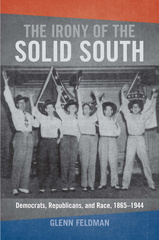
246 pages, 6 x 9
11 B&W figures - 1 map - 8 tables
Paperback
Release Date:22 Feb 2022
ISBN:9780817360559
Archipelagoes of My South
Episodes in the Shaping of a Region, 1830–1965
University of Alabama Press
A collection of essays representing forty-five years of reflection on the central problems of southern history bound together by a common concern with defining the crucial interaction of race and class in the formation of southern politics and life
“The tourist archipelagoes of my South / are prisons, too, corruptible” writes the poet Derek Walcott. While Walcott refers to the islands of the Caribbean, the analogous idea of a land made into solitary islands by an imprisoned and inherited corruption is historian J. Mills Thornton III’s American South. The captivating essays in Archipelagoes of My South: Episodes in the Shaping of a Region, 1830–1965 address this overarching and underlying narrative of Alabama politics and the history of the South.
Highlighting events as significant as the role of social and economic conflict in the southern secession movement, various aspects of Reconstruction, and the role of the Ku Klux Klan in the politics of the 1920s, Thornton draws from various points in the southern past in an effort to identify and understand the sources of the region’s power. Moreover, each essay investigates its subject matter and peels back layers with an aim to clarify why the enormous diversity of the southern experience makes that power so great, all the while allowing the reader to see connections that would not otherwise be apparent.
Archipelagoes of My South gathers previously uncollected essays into a single volume covering the entire length and breadth of Thornton’s career. The author’s principal concerns have always been the arc of regional evolution and the significance of the local. Thus, the mechanisms of political and social change and the interrelationships across eras and generations are recurring themes in many of these essays.
Even those who have spent their entire lives in the South may be unaware of the fractured layers of history that lie beneath the landscape they inhabit. For those southern residents who seek to comprehend more of their own past, this landmark compilation of essays on Alabama and southern history endeavors to provide illumination and enlightenment.
“The tourist archipelagoes of my South / are prisons, too, corruptible” writes the poet Derek Walcott. While Walcott refers to the islands of the Caribbean, the analogous idea of a land made into solitary islands by an imprisoned and inherited corruption is historian J. Mills Thornton III’s American South. The captivating essays in Archipelagoes of My South: Episodes in the Shaping of a Region, 1830–1965 address this overarching and underlying narrative of Alabama politics and the history of the South.
Highlighting events as significant as the role of social and economic conflict in the southern secession movement, various aspects of Reconstruction, and the role of the Ku Klux Klan in the politics of the 1920s, Thornton draws from various points in the southern past in an effort to identify and understand the sources of the region’s power. Moreover, each essay investigates its subject matter and peels back layers with an aim to clarify why the enormous diversity of the southern experience makes that power so great, all the while allowing the reader to see connections that would not otherwise be apparent.
Archipelagoes of My South gathers previously uncollected essays into a single volume covering the entire length and breadth of Thornton’s career. The author’s principal concerns have always been the arc of regional evolution and the significance of the local. Thus, the mechanisms of political and social change and the interrelationships across eras and generations are recurring themes in many of these essays.
Even those who have spent their entire lives in the South may be unaware of the fractured layers of history that lie beneath the landscape they inhabit. For those southern residents who seek to comprehend more of their own past, this landmark compilation of essays on Alabama and southern history endeavors to provide illumination and enlightenment.
. . . Thornton’s ideas and insights are valuable for those who study politics, southern history, and, of course, the history of Alabama.’
—American Nineteenth Century History
‘A marvelous collection of essays on the South by the brilliant J. Mills Thornton III. Based on exhaustive research and ranging across two centuries, Thornton’s prose is always lively, and his analysis razor-sharp. This book offers a model of historical thought and prose.’
—Jane Dailey, author of Before Jim Crow: The Politics of Race in Postemancipation Virginia
This collection of essays is a real contribution to the scholarly literature. Thornton illustrates the old adage that all politics is local in a much larger meaning and shows how the local conditions interact in contingent ways to shape the larger views of history as well as to mislead us on how history actually plays out at the local and community levels for individuals, black and white, protestant and Jewish, etc.’
—Orville Vernon Burton, author of The Age of Lincoln and In My Father's House Are Many Mansions: Family and Community in Edgefield, South Carolina
J. Mills Thornton III is author of Dividing Lines: Municipal Politics and the Struggle for Civil Rights in Montgomery, Birmingham, and Selma and Politics and Power in a Slave Society: Alabama, 1800–1860, which was awarded the John H. Dunning Prize by the American Historical Association in 1978. He is also professor emeritus of history at the University of Michigan, Ann Arbor.





